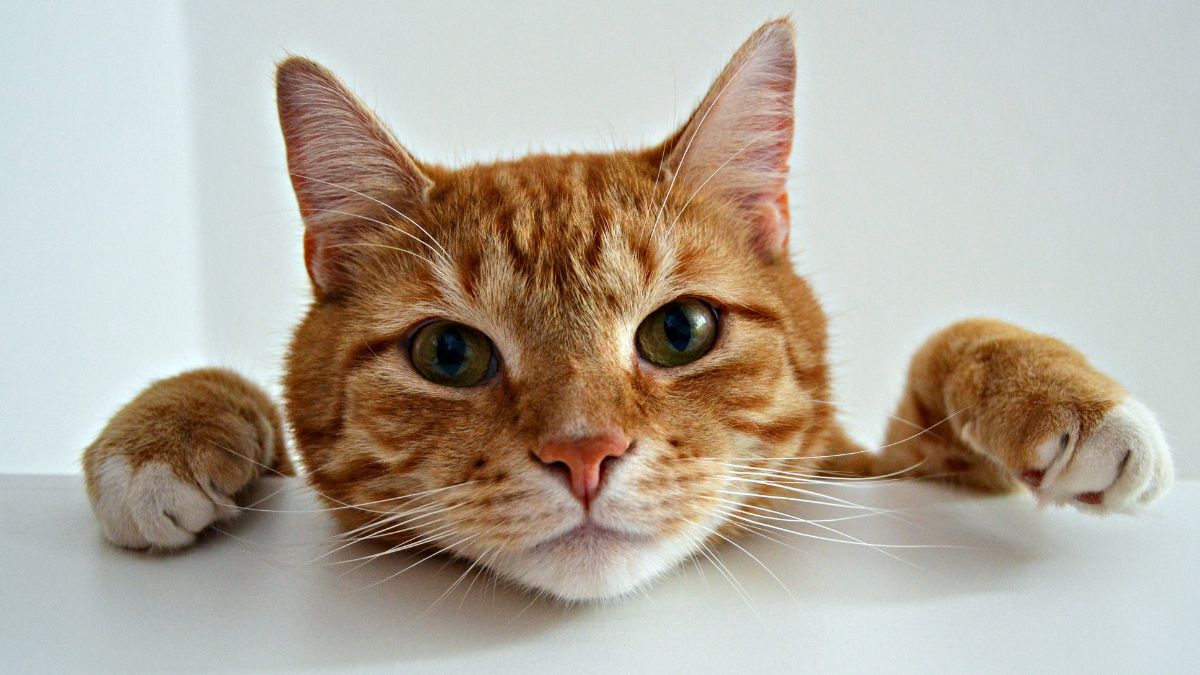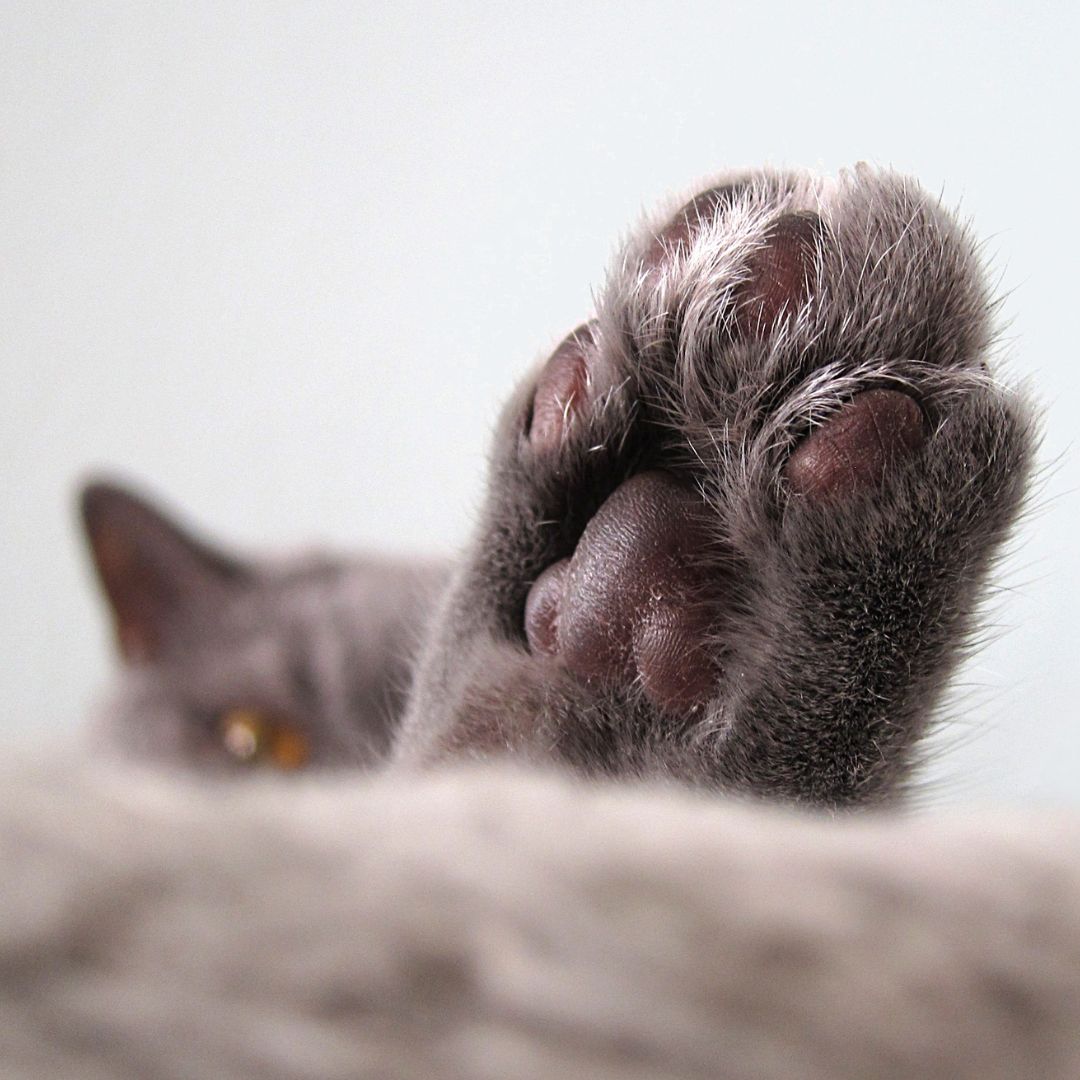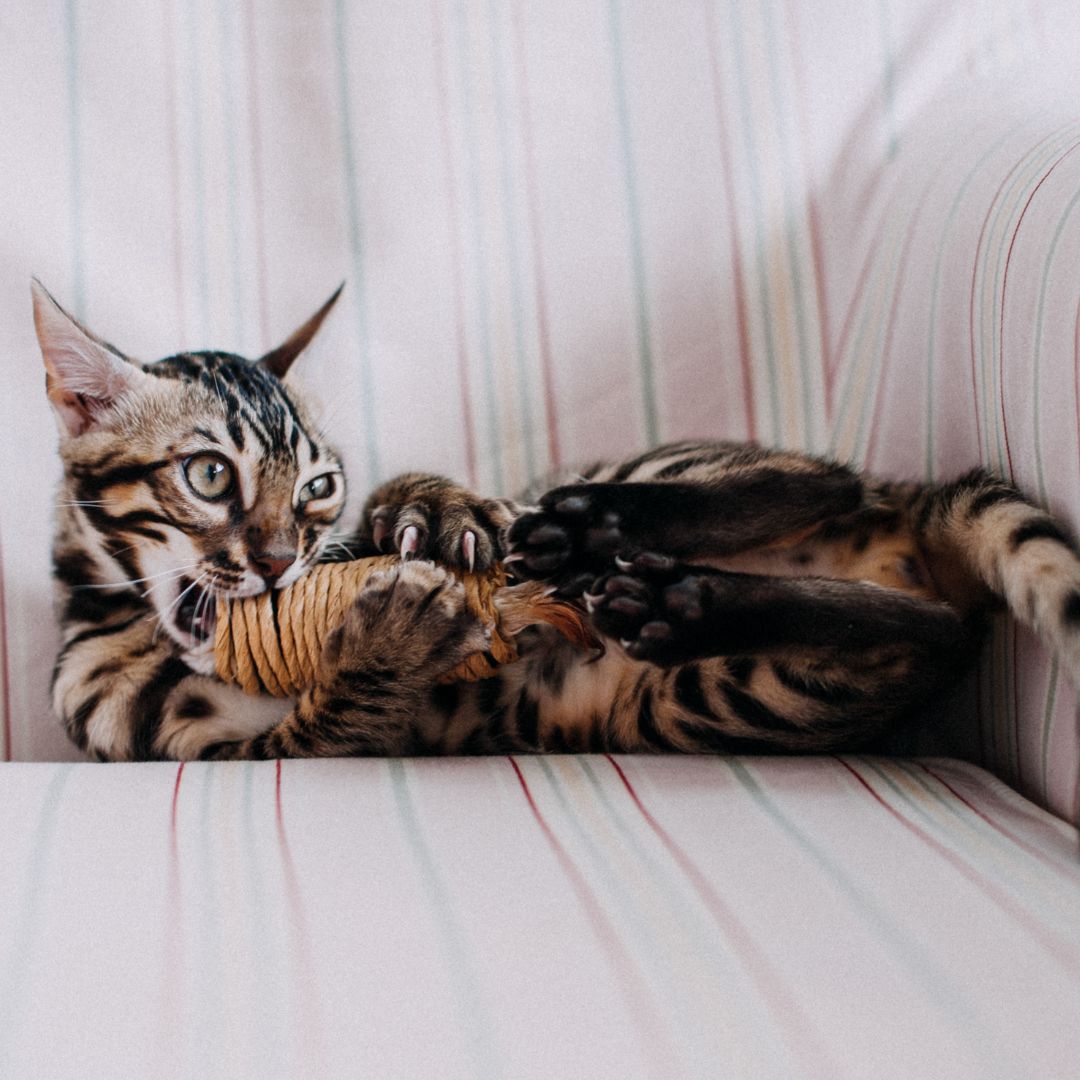
Cat Scratching Your Furniture? Why Cats Scratch and How to Stop It
15 Sept 2023.
Every paw parent knows the frustrations of purchasing a wonderful new couch or rug, only to have their cat use it as a scratching pad. Even if you pamper your kitty with the best cat scratching trees, it can seem like they’d rather turn their claws on everything BUT their designated scratch posts! Are you wondering how to get your cat to stop scratching your beloved sofa? Cat in a Flat explains why felines scratch, and how to get your cat to stop scratching your furniture.
Table of contents

Why do cats scratch?
It might seem like Mr Whiskers just enjoys destroying things, but scratching is a normal part of feline behaviour. There are many reasons why cats scratch:
- Marking territory: Kitty paws are the cutest, but did you know your furry friend’s feet contain what are called interdigital glands? Whenever Mr Whiskers stretches their paw or extends their claws, a strong scent is emitted. So, when your cat is scratching the furniture, they’re really marking their territory—both visibly and with a scent.
- Claw care: Your cat may resort to scratching the furniture as a way to keep their claws healthy and sharp. In the wild, your kitty would scratch trees or posts to remove dead layers from their claws and keep them sharp for hunting. Even though Mr Whiskers is fully a domesticated cat now, these natural instincts still carry over into the home.
- Physical and emotional health: Scratching is a form of exercise that activates your furry friend’s front legs and spine. This helps keep them physically fit. According to some studies, scratching can also help felines feel more emotionally secure and balanced. Hence, your cat may be scratching the furniture to physically and emotionally care for themselves.
- Boredom or attention: It’s not uncommon for cats to become bored—especially if they’re spending all their time indoors or aren’t getting enough mental stimulation. Scratching the furniture could be your cat’s way of getting your attention or expressing boredom.

How to get your cat to stop scratching
It’s important, and natural, that your cat enjoys scratching, and you should never try to stop them from doing it. Instead, you should encourage your fur friend to turn their claws on the appropriate scratching spots instead of your carpet or furniture.
Provide scratchers
In order to stop your cat from scratching your furniture, you need to provide a more desirable alternative. This is why it’s important to make sure your feline has enough sturdy scratching posts around the home. You should aim for a variety—from horizontal scratch pads so Mr Whiskers can lie on top, to posts so your fur friend can fully stretch up to scratch. If you’re looking for a great alternative to a cat tree, most felines love these cat scratching cardboard pads!
Placement matters
Be intentional about where you place your kitty’s scratching posts or pads. Try placing them in areas where your kitty enjoys relaxing, or by ‘problem spots’ (for example, sofa arms or sections of carpet your feline loves to claw). Encourage Mr Whiskers to use the designated scratching spots by spraying them with a pheromone scent like Feliway, using toys to capture your cat’s interest, or by placing some treats on top.
Reduce stress
Stress is an unavoidable part of life. Perhaps you’ve moved home with your cat, or taken them to the vet recently, or introduced a new fur friend into the home. Many things can cause stress, which in turn may lead to your cat scratching your furniture because they’re feeling anxious. While you can’t always avoid stressful situations, try to keep your kitty’s life as stress-free as possible. Maintain a routine, spend quality time with them every day, and hire a cat sitter to give Mr Whiskers quality care and attention whenever you’re away.
Decrease boredom
Minimize boredom by playing with your cat daily. Provide safe cat toys your kitty can play with on their own and easy access to windows where your feline can birdwatch. If you spend long hours outside the home every day, consider hiring a cat sitter to provide at-home day care services. A cat sitter can play with your cat and maintain a regular feeding schedule too. This will prevent boredom and discourage your cat from scratching things they shouldn’t!
But what if my cat still won’t stop scratching?
What should you do if your cat won’t stop scratching? It can be frustrating to take all the right steps and still find your cat scratching your lovely furniture. First off, declawing your cat to stop scratching should NEVER be the answer. Not only is it illegal in some countries like the U.K., but vets all around the world agree that declawing should be done only in very serious cases where other medical issues are at play. There are plenty of other safer, healthier alternatives to stop your cat from scratching:
- Frequent nail trims: Learn how to properly trim your cat’s claws, and do it every 1-2 weeks. This will minimize damage and stop your cat from scratching to constantly sharpen their claws.
- Nail caps: If your feline will tolerate it, try using claw caps. These go over the tips of your kitty’s claws and only need replacing every 4-6 weeks. Be sure to do thorough research before investing in nail caps—not all caps are non-toxic and comfortable for cats.
- Positive reinforcement: Reward good behaviour (such as Mr Whiskers using a scratching post) with treats and play time. Ignore your cat when they start scratching your furniture. Felines thrive on attention, even when it’s negative, so focus on reinforcing good behaviour instead.
- Clean problem spots: When a cat scratches, they leave their scent behind, and this encourages more scratching. Hence, you should thoroughly clean any ‘problem spots’ with a vinegar and water solution to remove your feline’s scent. If your kitty continues to scratch, spritz the area with a citrus scented spray. Cats hate the smell of citrus, and this will help discourage scratching. However, only use it as a last resort, as strong smells can be uncomfortable for your kitty’s sensitive nose!
Hopefully these tips will help you set your feline up for success! Looking for more cat-tastic tips? Check out our blog posts on how to deal with excessive meowing, and how to help your cat adjust when you’re away.
- #cat behaviour
- #catinaflat
- cat scratching
- cat scratching furniture
- destructive scratching
- stop cat scratching


